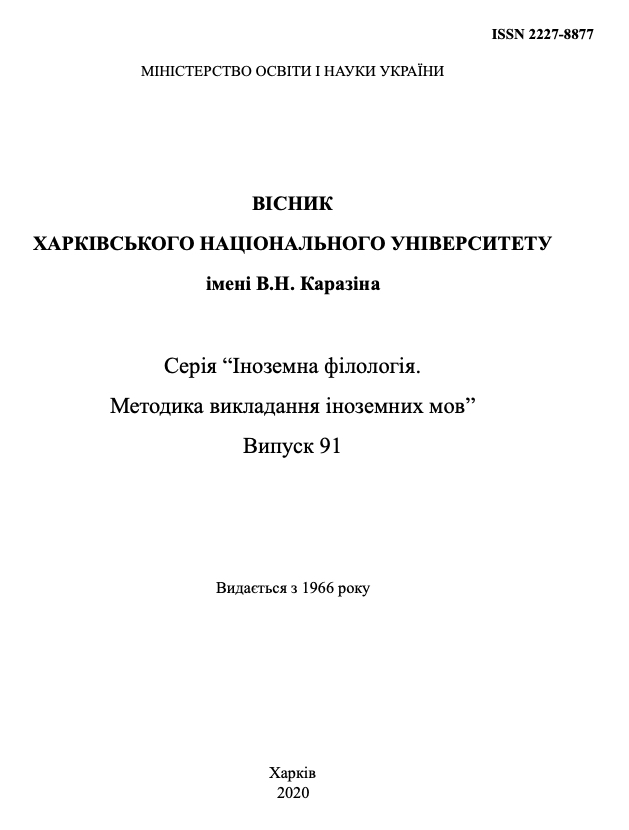Translation of the Comic in the Films of Wes Anderson (based on English and Ukrainian)
Abstract
The article is dedicated to defining the specific features of the expression of the comic in the auteur film “The Grand Budapest Hotel” by the American director and screenwriter Wes Anderson, as well as to the analysis of the translation of the comic on the material of the authentic movie dialogue, its dubbing and subtitling in Ukrainian. The relevance of our research is determined by the increased interest in the auteur films, especially in the genre of comedy and comedy drama, as well as by insufficient research on the representation of the functional types of the comic in Ukrainian translations for authentic films. The article provides definitions of the comic types and describes common difficulties in translating functional types of the comic and difficulties caused by the peculiarities of audiovisual translation. Common linguistic translation difficulties include translating the comic expressed by culturally-labeled lexical units or allusions to little-known phenomena. Typical and common for dubbing and subtitling extralinguistic difficulties include the need for keeping to the timeline. Dubbing also implies the achievement of phonetic synchronization, while subtitling presupposes the observance of the readable length of the subtitle. The article presents five principles with the help of which Wes Anderson achieves comic effect in the original movie dialogue. In general, these principles are a careful selection of time and place of the events and disruption of the characters in unusual situations. The article argues that in order to create a humorous effect, Wes Anderson uses both non-verbal humor expressed by elements of non-verbal communication, e.g. movements, glances, facial expressions, gestures, and verbally expressed comic, i.e. humor, irony, satire, and sarcasm. Each of the principles for achieving the comic effect was illustrated by the examples from the original movie dialogue and the analysis of their dubbing and subtitling in Ukrainian.
Downloads
References
Ermakov, K. D., and Ponomarchuk, D. S. (2018). Spetsifika dubljazha fil'mov s anglijskogo jazyka na russkij [Specific Features of Dubbing Movies from English to Russian]. Sbornik statej XXVIII Mezhdunarodnoj nauchnoj konferencii «Jazyk i kul'tura» – Language and Culture: Collection of Articles of the XXVIII International Scientific Conference. Tomsk : Dom Tomskogo gosudarstvennogo universiteta. 146–150. (in Russian)
Lyntvar, O. M. (2013). Vyrazhennia elementiv komichnoho v khudozhnomu teksti [Expressing the Elements of the Comic in a Literary Text]. Visnyk Lugans`kogo natsional`nogo universytetu imeni Tarasa Shevchenka. Filologichni nauky – The Journal of Luhansk Taras Shevchenko National University. Philological Sciences Series.. № 14(3). 69–73. (in Ukrainian)
Literaturoznavchyj slovnyk-dovidnyk [Literary Reference Dictionary]. (2007). / Za red. P. T. Grom'yaka, Yu. I. Kovaliva, V. I. Teremka. Ky`yiv : VCz «Akademiya». 752 p.
Lukyanova, T. G. (2012). Leksychni aspekty perekladu subtytriv (na materiali anglomovnykh khudozhnikh fil`miv) [Lexical Aspects of Subtitle Translation (Based on English-Language Feature Films)]. Nova filologiya – New Philology. № 50. 170–173. (in Ukrainian)
Lyubimova, T. B. Komicheskoe. Novaya filosofskaya encyklopediya [The Comic. New Philosophical Encyclopedia]. Elektronnaya biblioteka Y`F RAN. Available at: https://iphlib.ru/library/collection/newphilenc/document/HASH05148f47ad4907d1472a05 (in Russian)
Pohodnja, S. I. (1989). Jazykovye vidy i sredstva realizatsii ironii [Language Types and Means of Realizing Irony]. Kiev : Naukova dumka, 123 р. (in Russian)
Samokhina, V. O. (2012). Zhart u suchasnomu komunikatyvnomu prostori Velykoyi Brytaniyi i SShA [A Joke in Today's Communicative Space of the United Kingdom and the United States] : monografiya. Vyd. 2-e, pererob. i dop. Kharkiv : KhNU imeni V. N. Karazina. 360 p.
Skoromyslova, N. V. (2010). Teoreticheskij aspekt perevoda hudozhestvennyh fil'mov [The Theoretical Aspect of the Translation of Feature Films]. Vestnik Moskovskogo gosudarstvennogo universiteta imeni M. V. Lomonosova – The Journal of M. V. Lomonosov Moscow States University, 1, 153–156.
Slovnyk ukrayins`koyi movy [Ukrainian Dictionary]: v 11 t. (1970–1980). / red. rada: I. K. Bilodida (gol.) ta in. AN URSR. Instytut movoznavstva. Kyyiv : Naukova dumka. V. 4. 916 p.
Shon`, O. B. (2003). Movnostylistychni zasoby realizatsiyi gumoru, ironiyi i satyry v amerykans`kykh korotkykh opovidannyakh. Diss. kand. filol. nauk [Linguistic Stylistic Means of Realizing Humor, Irony and Satire in American Short Stories. Cand. philol. sci. diss.]. L`viv, 225 p. (in Ukrainian)
Anderson, W. Biography. Available at: https://www.biography.com/filmmaker/wes-anderson.
Cintas, J. D. (2010). Subtitling. Handbook of Translation Studies. Amsterdam : John Benjamins. Vol. 1. 468 pp.
Raskin, V. (1979). Semantic Mechanisms of Humor. Proceedings of the Fifth Annual Meeting of the Berkeley Linguistics. Society. pp. 325–335.
The Grand Budapest Hotel. Script. Available at: https://www.scripts.com/script/the_grand_budapest_hotel_587




